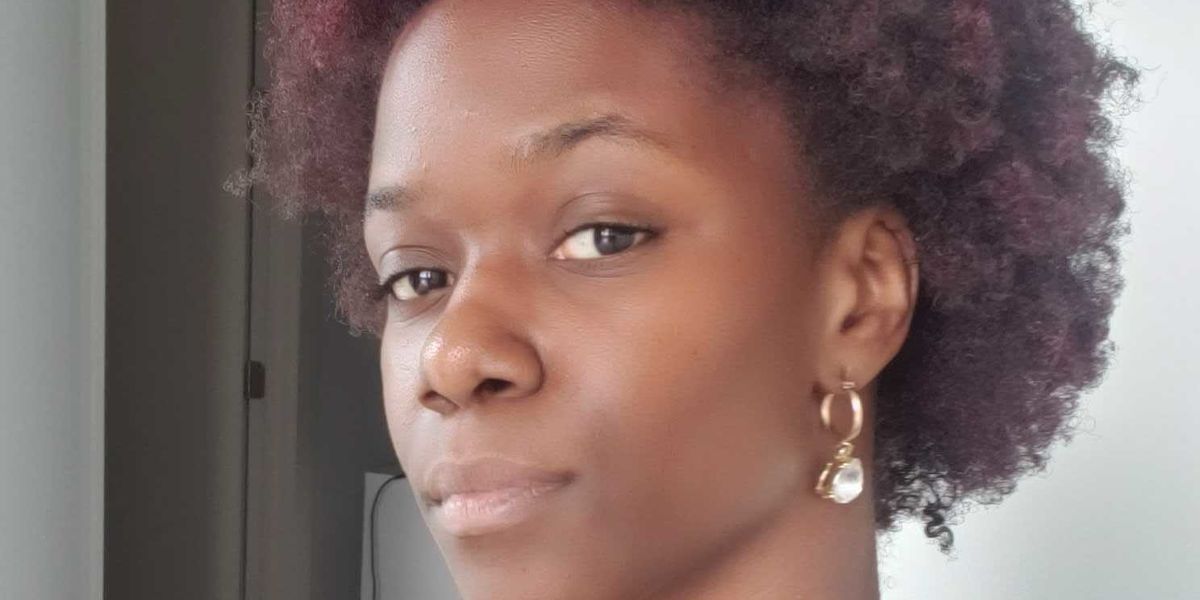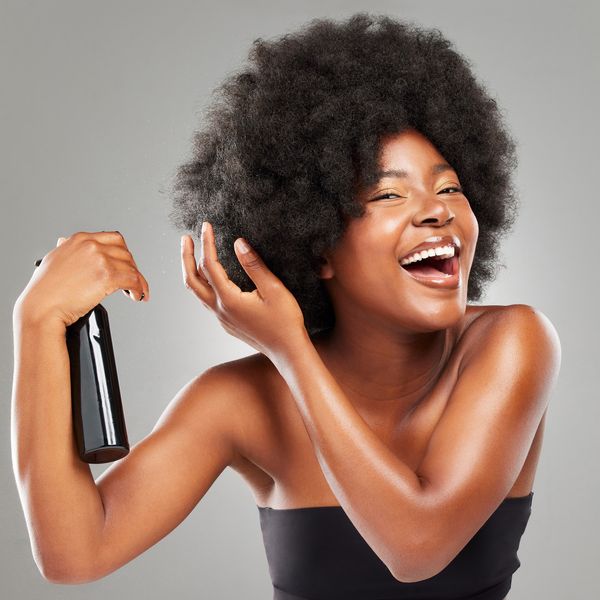
I Switch Up My Hair Color Weekly With No Damage Or Commitment — Here’s How
Change — even the subtlest kind — is welcomed now more than ever these days in my life. Enter hair shadowing, a technique that is exactly what it sounds like: Changing your hair color using (powder or cream!) eyeshadow. It's the cheap, quick, non-committal, and non-damaging way to switch things up with your tresses at your whims.
The technique was popularized by the Queen of Temp Hair Colors herself, Naturally Tash, a natural hair enthusiast who was on Instagram influencing long before being an influencer was really even a term.
I'd see her post a different hair color on Instagram so frequently that I thought, "Surely, sis ain't dying her hair like that every other week.What in the brittleness and breakage risk is going on here?" After further investigation, and talking to her myself several years ago, I was put on to "shadowing" (also known as hair chalking or temp coloring). It's as simple as finding a single eyeshadow pot chilling in your makeup bag (or picking up one at the drugstore for mad cheap) and sliding it down your tresses until the color pops — before or after the style.
You can literally take your hair from just black to black with pops of blue, pink, or whatever other color splashes on your heart at the time. And it all comes right back out with a single shampoo. Skeptical?
Behold, Natural Tash. The Rainbow-Brite of natural hair.
She now pulls her looks off with her own line of hair shadow products, called Crown Paint Colors. But before launching the brand, she was using regular-degular eyeshadow pots by different drugstore brands. I don't always have her Crown Paint Colors on hand, but I do always have something in my overflowing basket of beauty products at home. When I feel bored with my color and want something different for the day (or the week), I pull one out.
Now, unlike Naturally Tash, I'm not quite a rainbow gal. That said, I have been feeling the urge to try other natural hair colors because I've been mourning the in-person hair appointments with my favorite natural hair stylist and honestly. Plus, I've just been in a funk about my hair in general because that's just how it is sometimes. Sometimes, my lil' puff listens to me. Some days, I gets tired of fussing with it and just want to cut it off. Whenever I'm that over it, I remember my long-term growth goals and try to treat myself to a brief change with hair shadowing.
First, I pull whatever I have in my bathroom at the time. This creamy one looks like a reddish-pink shade but given my super dark hair color, I was already prepared for it to appear more like a rinse on my head, which I was fine with.

Marquaysa Battle
I usually apply it to twists or braids in my hair because it's easier for me to spread the color that way.

Marquaysa Battle
And when I've spread the paint on each twist and then taken down my twist-out like usual, here's the result:

Marquaysa Battle
It's super subtle and the best part is that you can go as loud or as muted as you want with your colors. The other day, I shadowed parts of my hair for a slightly brighter red look in different spots.

Marquaysa Battle
For me, the lower-key shades work. For Naturally Tash, it's the Roy G. Biv. And when either of us get tired of it, we can send the colors right down the drain and start over with a new color — sans the fear of breakage or a texture change due to moody chemicals typically found in some boxes of dye.
This is my small way to switch up my look. Yes, even if I ain't heading anywhere but the grocery store and the mailbox. When I shadow my kinky 'fro, it's about more than just testing new hair colors. For me, it's all about doing one small thing to adorn and celebrate my natural 4C hair even on the days when it's ticking me off the most. Even when my twist-outs fail (as, honestly, they frequently do).
Even when shrinkage has gotten in the way of the style I was going for on a particular day. I can always let my kinks and curls fall where they may and spread some color over all of it just to cheer things up and create some temporary change.
So would you try hair shadowing? Or have you already been using the method to color your crown? Let us know in the comments!
Featured image by Shutterstock
This article is sponsored by Hulu.
UnPrisonedhas returned for its highly anticipated second season, delving deeper into the complex dynamics of the Alexander family.
The series premiere comes a year after its debut season garnered rave reviews from fans and critics and earned record-breaking ratings for Hulu's Onyx Collective brand. UnPrisoned's success can be attributed to its raw, relatable themes and comedic appeal.
Inspired by creator Tracy McMillan's life, the show follows Paige (Kerry Washington), a therapist and single mother whose life takes an unexpected turn when her father, Edwin (Delroy Lindo) --who was released from prison-- moves in with her and her teenage son, Finn (Faly Rakotohavana).
Throughout UnPrisoned's first season, viewers witnessed how Edwin's incarceration deeply affected Paige's life and relationships. In the series, Paige unpacks her trauma through interactions with her inner child and her online followers. Meanwhile, Edwin is overcoming specific struggles with his own past that led to his life of crime, including a dysfunctional upbringing and his mother's arrest. As the Alexanders attempt to reconcile, new challenges arise.
This new season promises to further explore their unconventional family dynamic. Here are several compelling reasons why season two of UnPrisoned should be on everyone's watchlist.
The Alexander Family Life Is Still In Shambles
UnPrisoned's second season resumes where the series left off, with Paige grappling with the fallout from her troubled therapy practice and Edwin navigating life independently after moving out. Meanwhile, Finn faces his own challenges. The teenager is battling anxiety and seeking information about his father—a topic Paige avoids discussing.
The Alexander Family Are Attending Therapy To Resolve Their Underlying Issues
Amid the chaos in their lives, the Alexander family decides to mend their bond by confronting their past traumas. They seek professional help and attend therapy sessions with a “family radical healing coach,” played by John Stamos, a new cast member. This collective effort aims to unravel the complexities of their shared history and strengthen their relationships.
The process of unraveling each character's internal conflicts and their potential impact on future relationships may clash with Paige's textbook therapy approach. While Paige is used to being in the therapist's seat in both career and family, this forces her into the unfamiliar role of a patient during therapy sessions. This shift would compel her to look in the mirror and try a radically different approach.
The Alexander Family Learned A Big Lesson During A Therapy Session
In therapy, the Alexanders are tasked with addressing their individual traumas to salvage their remaining relationships. One of the family therapist’s eccentric suggestions was an exercise involving a family wrestling match. During this session, Paige faces tough questions about her refusal to share information about Finn's father.
While it's unclear whether this scene is reality or fantasy, the image of the family duking it out in the ring certainly makes for hilarious yet compelling television.
Paige Tries Dating Again Following Failed Relationships
Amid her life's chaos, Paige decides to step back into the dating field. However, her many attempts have left her with mixed results. The dating apps have turned out to be a fail, and an outing with her ex Mal (Marque Richardson), who is also her father's parole officer, doesn’t go quite as expected after he brings an unexpected guest – his new girlfriend.
The situation takes an awkward turn when Mal's new partner learns why the former couple split, partly due to Paige's self-sabotage.
UnPrisoned Is A Perfect Balance Of Comedy And Drama
As a dramedy, UnPrisoned takes a comedic approach to its heavy subjects. The show takes us on a ride with Paige's dating misadventures and navigating a friendship with her ex.
Other lighthearted moments include Edwin's attempts at CPR based on online videos and, of course, the antics of the Alexander family's unconventional new healing coach.
The second season of UnPrisoned is now available on Hulu.
UnPrisoned | Season 2 Trailer | Hulu
Feature image courtesy
Wealthy Restaurant Owner Shares The Money-Saving Hack She’s Used Since Childhood
“It doesn’t matter how big or small your finances are, the real gem is prioritizing what you have,” that’s the candor advice Ebony Austin, owner of Noveau Bar and Grill made sure she emphasized in our authentic convo. As a multi-hyphenated go-getter, she’s created more than 100 job opportunities and given away over $100 million to the community. When I inquired about her secret, she simply credits her skill to proper planning and a trusted team.
But the more the discussion progressed, the depth of that answer was revealed. Ebony opened up about how saving during the pandemic, a time when many businesses were forced to close their doors, aided her through difficult chapters. And after our authentic conversation, it made the importance of saving and business research crystal clear. Check out the convo below.
What was your journey like into money management? Have you always been good with your finances?
Yes, I learned it early. My grandparents had a construction company when I was growing up and my grandmother would teach me that with everything they worked for, she’d put 30% away. So no matter how many jobs I’ve had, once I tithed, I’d put up 30% away too. If I couldn’t pay my bills with that remainder, I’d get a second job. As crazy as it sounds, I’ve always been amazing at that.
So you’re definitely more of a saver then a spender, right?
Well, yes, but I do have a shopping addiction. But I save a lot. I’ve gone months and months without buying anything, then I’ll just go buy something big or small. But I’ve always known I still need backup plans. The beauty of having it is that you’re never trying to scramble. Even with my first property, I didn’t have any problems because my money was seasoned. I’ve always been consistent and knew a certain amount of money was going in the bank every paycheck.

Photo by Rari Filmz
Okay, so I can’t ignore the “shopping addiction” comment. Tell me about your splurge
So Louis Vuitton and Chanel are my favorites. Then I’m really big on supporting Black-owned businesses. I put that in my budget every month – sometimes a few times a month.
That’s a good one! What advice do you have for people trying to tighten up their budget?
Prioritize. When the pandemic happened, it gave us all a new outlook on life and what’s important. For example, going out to eat with my friends and family is essential. So I take time out monthly and figure out my expenses. For example, a lot of my friends are Tauruses, so that month, I need to plan extra birthday dinners. It only takes me like an hour, but it makes such a difference. People need to figure out what that looks like for them.
And what is your current final goal? Like, do you have a retirement plan?
Yes, once I get Noveau to 100 million! My biggest goal is for my team members to buy homes and establish themselves. But my end goal would be 15-20 restaurants, with five being investment restaurants. Also, of course, I want properties. I understand the importance of owning land. I think those are the main things.
Okay, so what is the worst piece of business advice you’ve been given?
Someone told me that I don’t need finances to open up a business. People say if you have a 590 credit score you can start it, but why would you do that? I mean you can do it with that score, but the interest looks way different. Build your credit first and avoid the extra costs. I used my own money to start a lot of businesses. Now when I look back I wouldn’t have even done it that way.
How would you have done it?
I would’ve used the bank's money. When you’re building your first location it can be really hard, but they do give them out. But you can’t just come in with a concept with no experience and ask for $100,000. No one will bet on that or believe in it. But if you have a concept, with a real plan and projections, start off with lines of credits. You can start small and build your business with $5,000.
Out of curiosity, what are your thoughts on investing and how do you do it?
I’ve invested in two restaurant concepts. Also, I have my own real estate investment company where we build, sell, and flip. I think investments are important to keep. Some of them require work. Personally, real estate is always key. To me it’s a safe option but they’re smart in general. That’s the only way you get to certain goals. Don’t let money sit in the bank – invest it.
Are there any unhealthy habits you had to unlearn in regards to investing or money management in general?
I had to learn to say no. A lot of times, everybody wants something. It’s hard to say no to people who are capable of doing things for themselves.
Heavy on the “who are capable of doing things for themselves.” What’s been your biggest struggle in building your business? Was there ever a moment you questioned it?
As an entrepreneur, we all have those moments where we’re ready to throw in the towel. But my biggest challenge was building a team and getting the word out there. But I also know God doesn’t make mistakes. At the time, the more I prayed and started to get to know the team, I came to the realization that I needed to let go of almost all of them. It wasn’t just about what was aligned with me and my purpose but also Nouveau.
Also, I had to separate myself and the business because I’m not going to care if they’re late three times in a row but the business will. Those were the most challenging things for me: saying no, building the right team, and separating the business and myself.
God heard every prayer though. Because now the team at Nouveau is amazing. They put all the pieces together. It’s all about praying and taking care of your people.
Finally, what does wealth look like to you?
Making sure my family is good and my mother doesn’t have to work again. Also, wealth is ensuring my team is reaching their goals. I teach my team how to save money, too. It makes no sense that I’m the only one that’s profitable. When I became a millionaire, my goal was to figure out who I’ll make the next millionaire. I want families to understand how we get here and how we stay here. Wealth is not a one-woman show.
Let’s make things inbox official! Sign up for the xoNecole newsletter for love, wellness, career, and exclusive content delivered straight to your inbox.
Feature image by Rari Filmz









